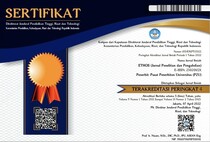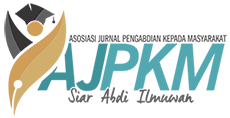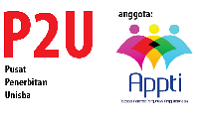Increasing Food Security Through Waste Management In Pandemic Time
Abstract
The abstract of the During the pandemic, people's activities were dominantly carried out at home, resulting in increased online shopping activities and their packaging which caused accumulation of household waste. The RW 05 area of Sukamenak Village, Margahayu District, Bandung does not yet have independent waste management, coupled with the low awareness and knowledge of residents about waste. Some residents were affected by layoffs, as a result of which the fulfillment of food needs was disrupted. This is the starting point for the waste problem in RW 05. Bandung State Polytechnic (Polban), takes a role in helping to solve this problem. PKM activities aim is to increase public knowledge in sorting household waste through the 3R program (Reuse, Reduce, Recycle), effective management of inorganic and organic waste, Budikdamber (Cultivating Fish in Ember) aimed at increasing family food security, and building a bank The methods used are training, technical guidance in the field, mentoring, and evaluation. The results of the activity show that inorganic waste management produces daily necessities and can be sold to increase income. Organic waste is processed into liquid fertilizer and solid fertilizer for yard greening. Catfish and kale from Budikdamber can increase family food security, especially meeting protein and vegetable needs. The construction of the "Suka Berseri RW 05" waste bank can reduce the volume of waste and residents can withdraw their savings at any time. The results of the questionnaire show that people's awareness and knowledge on waste management increased significantly.
Keywords
Full Text:
PDFReferences
Achiraeniwati, et al. (2016). Community Assistance in Processing Household Organic Waste to Support the Urban Farming Program. Ethos, 238-290.
Afila, A. (2021). Evaluation of Household Waste Management After the Covid-19 Pandemic in Deli Serdang Regency. Environmental Law Development.
Amalia, V., Hadisantoso, E. P., Wahyuni, I. R., & Supriatna, A. M. (2020). Handling Household Infectious Waste During the COVID-19 Outbreak. http://digilib.uinsgd.ac.id.
Arikunto, S. (2010). Research Procedures A Practice Approach.
Arisona, R. D. (2018). 3R Waste Management (Reduce, Reuse, Recycle). Al Ulya: Journal of Islamic Education.
Bachtiar, H., Hanafi, I., & Rozikin, M. (2015). Development of a Garbage Bank as a Form of Community Participation in Waste Management (Case Study of the Malang Garbage Bank). Journal of Public Administration, 128-133.
Fatoni, N., & et al. (2017). Utilization of Waste into Craft Products. Journal Walisongo.
Nasrudin, & Nurhidayah, S. (2021). Budikdamber to Ensure Food Availability during the Covid-19 Pandemic at KWT Mawar Bodas. Abditani Community Service Journal.
Nurdeni, & et al. (2021). Household Food Security through Utilization of Home Gardens by Cultivating Vegetables in the New Adaptation Period of the Covid-109 Pandemic. Journal of Community Service.
Nursandi, J. (2018). Cultivating Fish in "Budikdamber" Buckets with Aquaponics in Narrow Land. Proceedings of the National Seminar on Agricultural Technology Development.
Regulation of the Minister of Home Affairs concerning Guidelines for Waste Management. (2010).
Ministerial Regulation on Garbage. (2006).
Putra, H. P., & Yuriandala, Y. (2010). Study on Utilization of Plastic Waste Into Creative Products and Services. Journal of Environmental Science and Technology, 21-31.
Sandika, I. K., Ekayana, A. A., & Suryana, P. E. (2018). Waste Management Education for Communities in Pecatu Village. Widya Bhakti Popular Scientific Journal.
Santoso, S. (2011). Complete Guide to SPSS Version 20. Jakarta: Kompas Garmedia.
Saputro, H. D., & Dwiprigitaningtias, I. (2022). Handling of Infectious Waste (Medical Waste) Due to Covid-19 for Environmental Preservation. Journal of Legal Dielectrics.
Setiyaningsih, D., Herwina, B., Iswan, & Al Mas'udi, R. A. (2020). Application of the Budikdamber and Aquaponics Systems as a Strategy in Strengthening Food Security amid the COVID-19 Pandemic.
Sri Suryani, A. (2014). The Role of the Waste Bank in the Effectiveness of Waste Management. Center for Management and Information Studies (P3DI) Secretary General of the DPR RI.
Law of the Republic of Indonesia No. 8 concerning Waste Management. (2008).
Widodo, & et al. (2021). Building the Important Role of the Community in the Utilization of Waste as a Resource. Unpam Journal.
DOI: https://doi.org/10.29313/ethos.v11i1.8486
Refbacks
- There are currently no refbacks.
Alamat Redaksi:
LPPM Unisba, Lantai 2, Jl. Purnawarman 63, Bandung 40116, Jawa Barat, (022) 4203368 , (022) 4264064. ethos.unisba@gmail.com / ethos@unisba.ac.id

This work is licensed under a Creative Commons Attribution-NonCommercial-ShareAlike 4.0 International License.














